Back to the Nevada Polls
The Nevada Senate race is, in many ways, a three-way in which none of the above could be a spoiler for Angle.
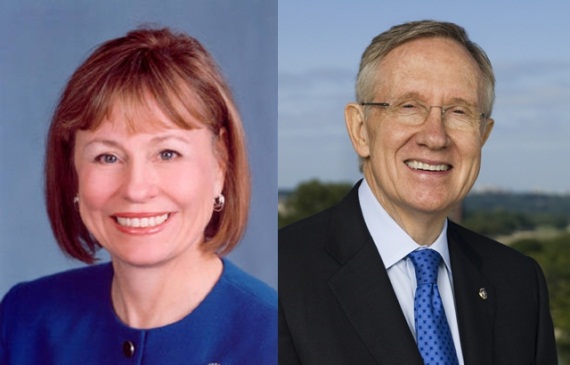 Late last week I posted an entry entitled “Nevada Poll: Bad News for Reid, Worse News for Angle” concerning a new Mason-Dixon poll that showed a statistical tie statistically insignificant lead* in the Nevada Senate race.
Late last week I posted an entry entitled “Nevada Poll: Bad News for Reid, Worse News for Angle” concerning a new Mason-Dixon poll that showed a statistical tie statistically insignificant lead* in the Nevada Senate race.
The specific numbers in question were as follows:
In the latest survey of likely Nevada voters, Reid got 45 percent support compared with 44 percent for Angle, a statistical tie. The margin of error is plus or minus 4 percentage points.
Another 5 percent were undecided, 4 percent picked “none,” and 2 percent other candidates, according to the telephone poll of 625 likely registered voters taken Monday through Wednesday.
Those numbers have been roughly in that range for some time now, and it is not unusual for commenters to posts on this subject to point out that Reid hasn’t been able to reach the magic 50% number in any of the polls (a sign that is normally considered especially problematic for an incumbent—something I would not dispute).
Along those lines, some readers took exception to my characterization of the news in the poll being bad for Reid but worse for Angle. The reason I said that is based on the fact that the negatives in the poll for Angle were so, well, negative. For example, “Some 68 percent of those surveyed said they would have preferred if a candidate other than Angle had won the GOP primary. Among them were 71 percent of Republicans, 71 percent of nonpartisans and 64 percent Democrats.” Emphasis mine. Angle is in a particularly difficult position in a race that ought to be a slam dunk for a Republican given Reid’s job approval numbers and the state’s economic condition.**
First, these numbers clearly will affect the enthusiasm for some of the voters that Angle needs to win in November.
Second, and more importantly, is the fact that voters in Nevada have a “None of These Candidates” option on the ballot. This is a place that voters who are disgusted with the choices before them may go if they can’t decide between Out-of-Touch Reid and the Crazy Lady.*** If only a small percentage of voters who would have voted for just about any other GOP candidate can’t bring themselves to vote for Angle and go the “None of These Candidates” route, then Reid’s inability to crack 50% may not matter.
The bottom line is that it seems more likely that Reid can erode Angle’s support at this point more than Angle can Reid’s. In other words, Reid is a known quantity and so his ~45% is probably set. Angle, on the other hand, is a less known quantity and so it should be easier to chip a few points off her ~45%. And Reid’s ad campaign appears poised to paint her as extreme (see, for example, here).
The “None of These Candidates” option has played a roll in past elections, including one involving Reid. Nate Silver noted the following a few days ago:
Since 1975, Nevadans have had the choice of voting for “None of These Candidates,” which appears as a ballot line along with the named candidates. The option has waxed and waned in popularity. But in 1976, None of These Candidates actually won the plurality of votes in the Republican primary for the U.S. House. (The election was awarded to the second-place finisher, Walden Earhart.) And in other cases, the ballot option has played a spoiler role: the 1.2 percent of voters who selected None of These Candidates in the 1996 Presidential race was larger than the margin separating Bill Clinton and Robert Dole. And in the election for U.S. Senate in 1998, the 8,125 votes for None of These Candidates easily outdistanced the 395-vote margin between Harry Reid and John Ensign, allowing Mr. Reid to be re-elected.
As such, I think it is useful to think of the Nevada race as a three-way contest pitting Reid v. Angle and Angle v. None of These Candidates (and to a lesser degree, Reid. None of the These Candidates). This is why I think that Angle’s high negatives are more problematic for her than is Reid’s inability to crack 50%. Indeed, the 1998 race shows that Nevada voters have been willing in the past to vote none of the above, even if it meant doing so helps one of the candidate win.****
Again: it seems reasonable to assume that Reid may have already hit his floor, while it may be that Angle is near her ceiling. Further, while most readers of this blog likely think strategically and would see a vote for “None of These Candidates” as a vote for Reid and further would see a vote for Angle as a vote for a potential Republican majority in the Senate, one suspects that for some voters, general dissatisfaction with the choices on the ballot may lead a sliver of the electorate to vote for none of the above regardless of the fact that would be a vote that helps Reid.
Further, while certainly Nevada has a fair share of conservative voters, the bottom line is that it is also a state where prostitution is legal and where gambling is a major industry. As such, one suspects that Angle’s version of social conservatism is going to turn a fair number of voters off.
As an aside, it strikes me as kind of weird that voters have the option to say “none of the above,” but if “none of the above” wins, one of the above still wins (so to speak). It seems to me that if the voters prefer “none of the above” that a new election ought to be held.
*See the comments below for an explanation.
**Nevada’s unemployment rate was 14% the last time I checked and they have been amongst the hardest hit in terms of foreclosures.
***And make no mistake, Angle is trying to paint Reid as an out-of-touch liberal/socialist/Obamabot (or whatever else you want call him) and Reid is going to paint Angle as extreme, if not nuts.
****It is extremely likely that more than 395 of the 8,125 who voted “None of These Candidates” preferred Ensign to Reid in terms of rank ordered preferences (and likewise, there were probably others in that 8,125 that preferred Reid to Ensign), but given the three choices (instead of just the two plus third party candidates) opted out of voting for either of them since they could do so and still vote.

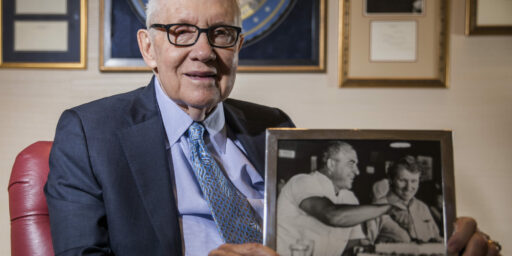
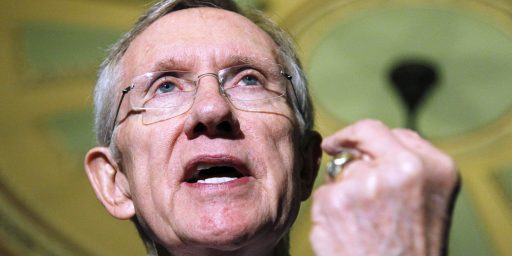
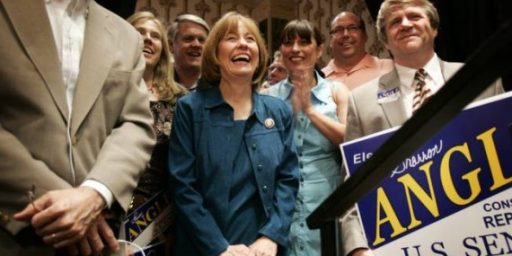
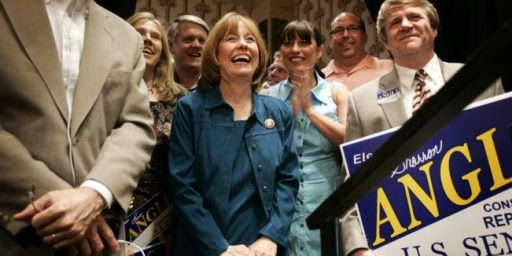
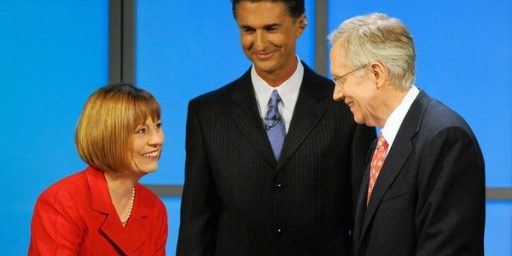
Someone should do a poll that let’s voters choose between Reid, Angle, and NOTA. That would be interesting to see
Taylor, care to make a bet. Reid cannot run on his record. He must try to demean Angle using lies and distortions of things she has said. It is a very old tactic. It might work if she did not have Reids record to point to. I would entertain a bet of up to $1K if you are of a mind to. I would have to check with my bette half first, but what say you. You get Reid, I get Angle.
The Numbers Guy at WSJ has a good summary of <a href=”http://blogs.wsj.com/numbersguy/whats-a-statistical-tie-anyway-234/”>the problem with the term, “statistical tie”</a>.
I would like to know how much Reid and the Dems have been pouring into Reid’s Race compare to Angle and the Reps. If it is comparable then it is a close race. If it is lopsided one way or other and the the lesser side puts out a good chunk of ads in the last two months, the lesser side has a good chance to win.
The term “statistical tie” is incorrect. At the risk of being pedantic, I would suggest we don’t follow the journalists, but rather the statisticians in this matter, and refer to it as a “statistically insignificant lead” (in this case for Reid). Assuming a proper polling technique (which I will assume, given the reputation of Mason Dixon), chances are that Reid really is ahead. But the margin of error reminds us that the chances that he is not, in fact, ahead in the broader voting population is too great to say with confidence that he is ahead. But that’s not the same thing as the statistics saying they are tied. They do not say that.
/pedantism
I agree with all your points on the impact of “none of the above.” And it is weird–no, stupid–to have such an option on the ballot, but for its potential “victory” to have no electoral effect. Frankly, it’s dumb to have it on the ballot at all. Far better to have more choices, and spoiler-proof electoral methods like instant runoff.
(comment form not working well, so trying to re-post this one, which was supposed to go in before the one above, with the non-recognized link)
Zels — As a hard-working taxpayer, I am offended that you are gambling with the government money that you greedily steal from the rest of us. It’s bad enough that you take unemployment compensation while insisting that this is a socialist program, now we find out you are willing to bet with it. Have you no shame?
@MSS: Point taken about the terminology.
Zels.
I’ll take that bet.